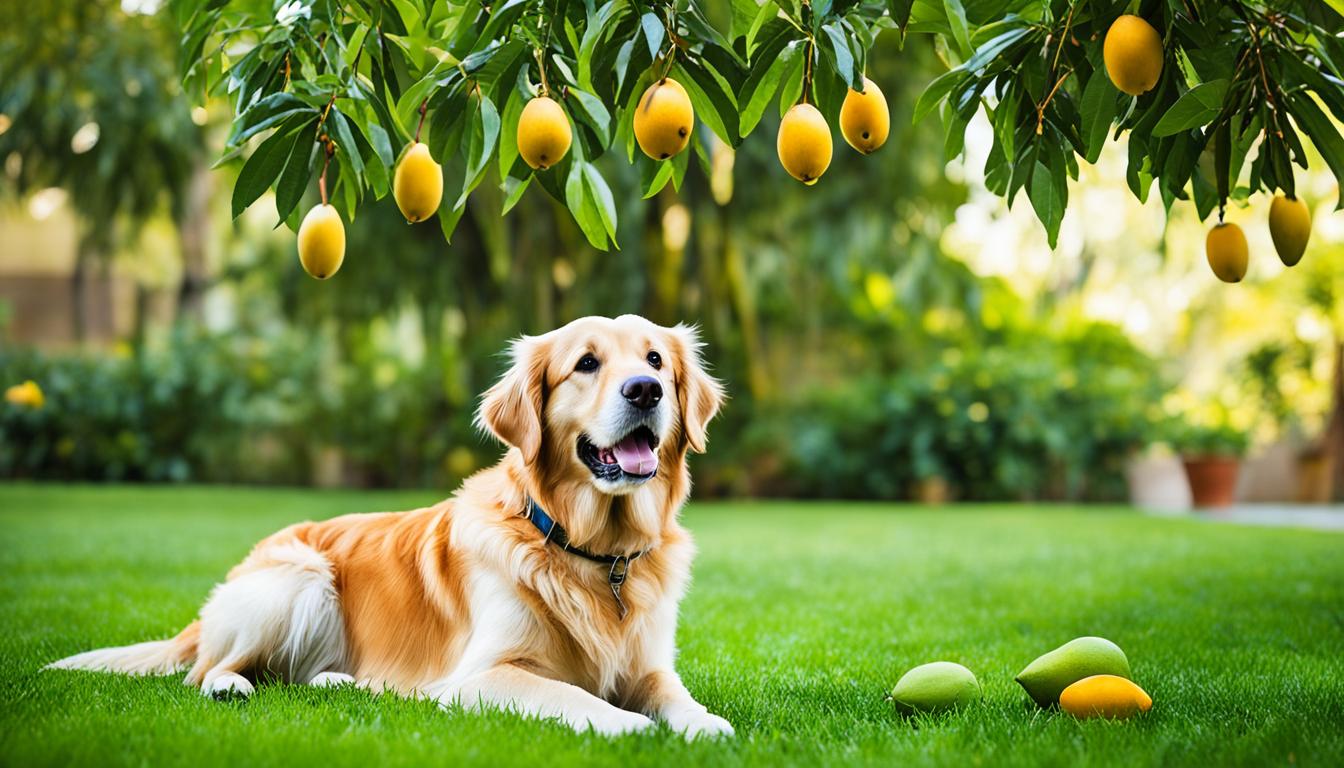As an Amazon Associate I earn from qualifying purchases.
Picture this: it’s a warm summer day, the sun is shining, and you’re enjoying a juicy, ripe mango. The sweet, tropical flavor bursts in your mouth, bringing a wave of delight and refreshment. But as you savor each bite, you can’t help but wonder, can your furry best friend share this delicious treat with you?
Well, good news! Dogs can indeed eat mangoes, and it can be a healthy and enjoyable addition to their diet. However, there are a few things you need to know before offering this delightful fruit to your canine companion.
Key Takeaways:
- Mangoes can be a safe and healthy treat for dogs
- Remove the pit and skin before feeding mango to your dog
- Offer mango in moderation and be aware of the high sugar content
- Mangoes provide dogs with vitamins A, B6, C, and E, and fiber
- Consult with your veterinarian if you have any concerns or questions
Health Benefits of Mango for Dogs
Did you know that mangoes, known as “The King of Fruit,” offer numerous health benefits for your four-legged companion? These delicious tropical fruits are not only packed with flavor but also contain a wide range of essential nutrients that support your dog’s overall well-being.
When it comes to canine nutrition, mangoes are a fantastic addition to your dog’s diet. These juicy fruits belong to the same family as pistachios and cashews and are often referred to as a “Super Fruit” due to their impressive nutrient profile.
So, what are the health benefits of mango for dogs? Let’s take a closer look:
Vitamins and Minerals
Mangoes are a nutritional powerhouse, providing more than 20 essential vitamins and minerals to support your dog’s health. They are particularly rich in:
- Potassium: Helps maintain healthy kidney function and supports heart and muscle function.
- Magnesium: Aids in nerve function and promotes bone growth in dogs.
- Vitamin B6: Supports the production of red blood cells and helps maintain a healthy immune system.
- Folate: Essential for DNA synthesis and red blood cell formation.
In addition to the vitamins above, mangoes are also abundant in vitamin C, which plays a crucial role in immune response and collagen production, promoting healthy skin and joints in dogs. These fruits also contain vitamin A and vitamin E, both of which contribute to healthy vision and provide antioxidant benefits.
Antioxidants
Mangoes are loaded with antioxidants that help protect your dog’s cells from damaging free radicals. These antioxidants help reduce inflammation, support the immune system, and promote overall health and vitality in your furry friend.
Dietary Fiber
Mangoes are an excellent source of dietary fiber, which plays a vital role in your dog’s digestion. Adequate fiber intake helps regulate bowel movements, improves stool quality, and promotes overall gastrointestinal health.
Feeding your dog mangoes in moderation can provide them with these incredible health benefits. However, it’s important to remember that moderation is key, as excessive consumption of mangoes can lead to digestive upset due to their high sugar and fiber content.
To ensure your dog enjoys the health benefits of mangoes while avoiding potential risks, it’s crucial to remove the skin and pit before offering them this tasty treat. By doing so, you can keep your furry friend safe and indulge them in the goodness of this delicious fruit.
Now that you’re aware of the health benefits of mango for dogs, you can confidently incorporate this tropical fruit into your canine companion’s diet. Remember, always consult with your veterinarian for specific dietary guidelines tailored to your dog’s unique needs.
Risks of Feeding Mango to Dogs
While mangoes are generally safe for dogs, it’s important to be aware of the risks associated with feeding them this tropical fruit. Understanding these risks will help you make informed decisions about including mango in your dog’s diet. Here are the main risks to consider:
- High sugar content: Mangoes are naturally sweet, and while they can be a tasty treat for your furry friend, the high sugar content can lead to dental decay, obesity, and high blood sugar levels in dogs, especially those with diabetes. Remember to offer mangoes in moderation to keep your dog’s sugar intake in check.
- Mango pit hazards: The pit of a mango should never be fed to your dog. It contains amygdalin, which can be toxic and potentially turn into cyanide when chewed and ingested. Always remove the pit before giving mango to your dog to prevent any accidental poisoning.
- Fiber-related digestive issues: Although fiber is generally beneficial for dogs’ digestion, excessive consumption of mangoes can lead to digestive problems such as constipation, diarrhea, gas, or stomach upset. Be sure to remove the skin and pit and introduce mangoes gradually into your dog’s diet to avoid any gastrointestinal issues.
By being mindful of these risks and taking appropriate precautions, you can safely incorporate mango into your dog’s diet as an occasional and enjoyable treat.
Guidelines for Feeding Mango to Dogs
When it comes to treating your four-legged friend to some tropical goodness, mangoes can be a delightful option. However, like any other treat, moderation is key to ensure your dog’s wellbeing.
For larger dogs, it is recommended to offer a quarter cup of fresh mango once or twice a week. This provides a tasty snack without overloading them with excessive sugar. On the other hand, for smaller dogs, it’s best to opt for size-appropriate pieces to prevent choking hazards and digestive issues.
Craving a refreshing and frozen treat for your pup? Frozen mango chunks can be a fantastic way to keep them cool on those scorching summer days. Just make sure to remove the skin and pit before freezing, allowing your dog to enjoy a icy delight packed with vitamins and antioxidants.
When preparing mango for your furry friend, always remove the skin and pit. While the sweet flesh is safe for dogs, the pit can be a choking hazard, and the skin is indigestible and may cause digestive discomfort. Additionally, be mindful of any added sweeteners or artificial ingredients, as these can be harmful to your dog’s health.
Looking to get creative with mango in your dog’s diet? There are plenty of mango recipes available to tantalize their taste buds! Treats like mango treats, mango chicken dog cookies, and frozen mango pops with other fruits can provide your pup with a variety of flavors and textures.
Remember, always consult with your veterinarian before introducing any new foods into your dog’s diet, including mangoes. They will be able to provide personalized advice based on your dog’s specific needs and dietary requirements.
So go ahead, treat your furry companion to some mango goodness, following these feeding guidelines, and watch their tail wag in delight!
Conclusion
You now know that dogs can enjoy the deliciousness of mangoes in a safe and healthy way. By removing the pit and skin, you can provide your furry friend with a nutritious treat packed with essential vitamins, minerals, antioxidants, and fiber. So, go ahead and treat your dog to some juicy mango goodness!
However, it’s essential to keep in mind the potential risks associated with feeding mango to dogs. Always offer mango in moderation to prevent digestive issues caused by its high sugar content and fiber. Additionally, be cautious of the pit, as it poses a choking hazard. Your dog’s safety should always be your top priority!
Remember, if you have any concerns or questions about integrating mangoes into your dog’s diet, consult with a veterinarian. They can provide tailored advice based on your dog’s specific needs and help ensure that mangoes remain a safe and enjoyable addition to their snacking options.
FAQ
Can dogs eat mango?
What are the health benefits of mango for dogs?
What are the risks of feeding mango to dogs?
What are the guidelines for feeding mango to dogs?
Can you share any mango recipes for dogs?
Source Links
- https://www.pumpkin.care/blog/can-dogs-eat-mangoes/
- https://kabo.co/blog/can-dogs-eat-mango
- https://www.dogfoodchat.com/threads/can-dogs-eat-mango.38569/
As an Amazon Associate I earn from qualifying purchases.

